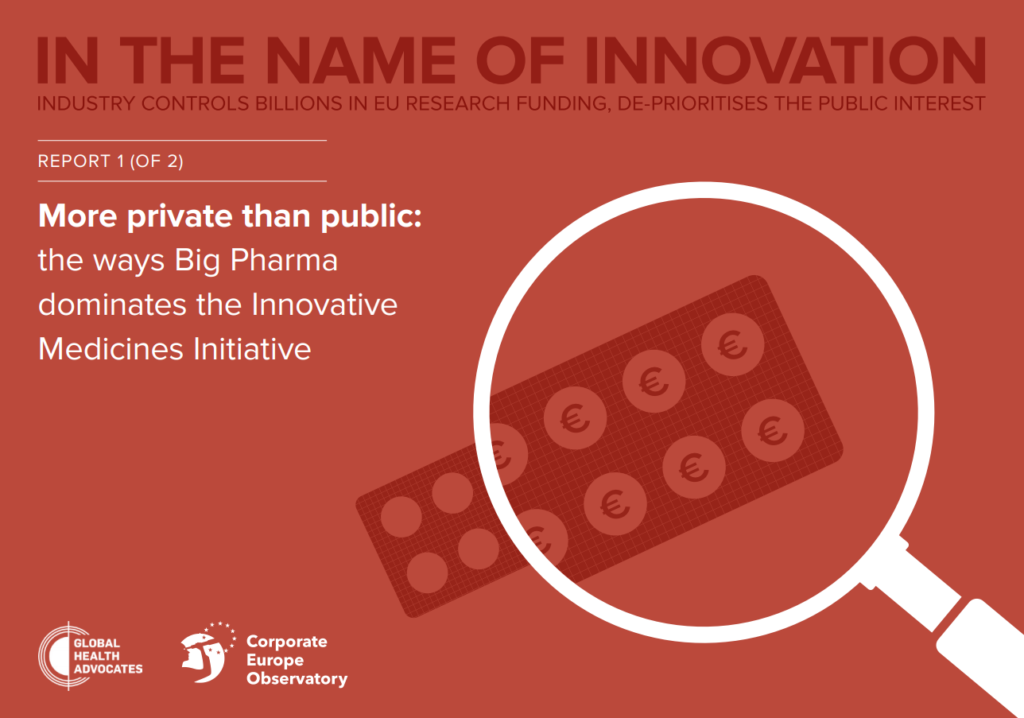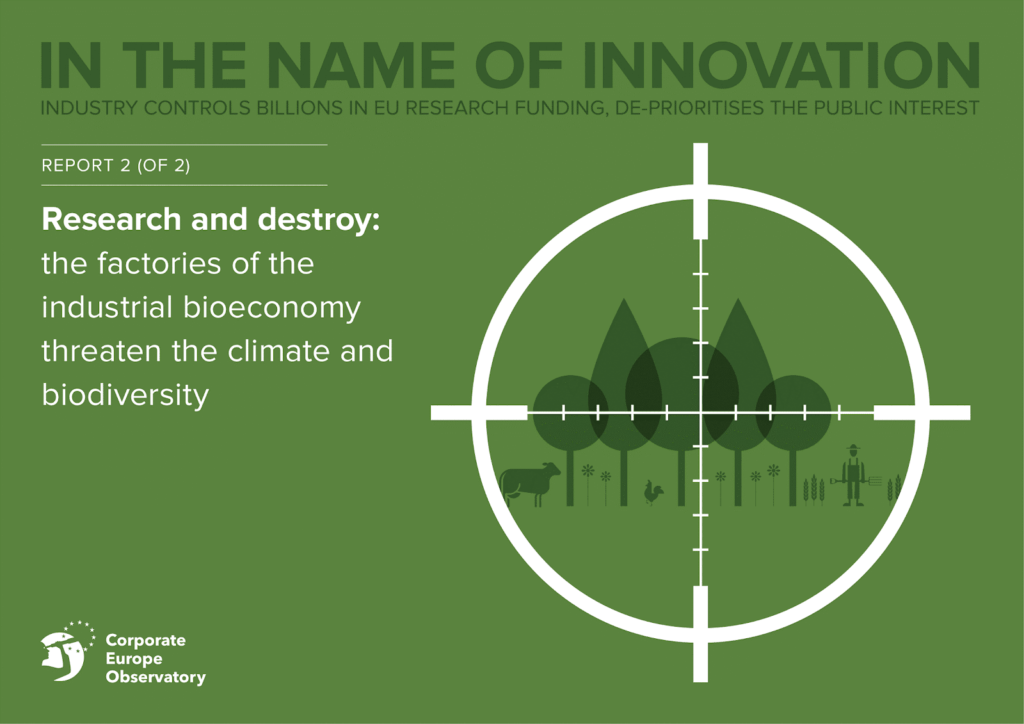For the past 15 years, industry lobby groups have controlled the use of €3.6 billion in public EU funds for health and climate research through two public-private partnerships, at the expense of the public interest. These lobby groups have prevented these partnerships from meaningfully investing into research projects addressing societal challenges such as epidemic preparedness, or viable climate solutions, and mostly made them fund their own commercially profitable research projects instead. They are now lobbying for these partnerships to be renewed in a comparable form in the next EU budget, under the EU’s Research programme ‘Horizon Europe’ (2021-2027), with the support of the European Commission’s DG Research & Innovation.
Two in-depth reports ‘In the Name of Innovation’ are published today by the NGOs Global Health Advocates (GHA) and Corporate Europe Observatory (CEO). They investigate two research Public-Private Partnerships (PPPs) between the European Commission and industry lobby groups: the Innovative Medicines Initiative Joint Undertaking (IMI) and the Bio-Based Industries Joint Undertaking (BBI) :
 ‘More private than public: the ways Big Pharma dominates the Innovative Medicines Initiative’: In the name of innovation in health research, pharmaceutical trade association and lobby group EFPIA (European Federation of Pharmaceutical Industries and Associations) has steered a €2.6 billion public EU research budget through IMI, but has failed to meaningfully invest in research areas where public funding is urgently needed, including long-term preparedness for epidemics, HIV/AIDS, and poverty-related and neglected tropical diseases. Instead the ‘partnership’ mostly used the budget to fund research in areas that were more commercially profitable for the pharmaceutical industry.
‘More private than public: the ways Big Pharma dominates the Innovative Medicines Initiative’: In the name of innovation in health research, pharmaceutical trade association and lobby group EFPIA (European Federation of Pharmaceutical Industries and Associations) has steered a €2.6 billion public EU research budget through IMI, but has failed to meaningfully invest in research areas where public funding is urgently needed, including long-term preparedness for epidemics, HIV/AIDS, and poverty-related and neglected tropical diseases. Instead the ‘partnership’ mostly used the budget to fund research in areas that were more commercially profitable for the pharmaceutical industry.
‘Research & Destroy: the factories of the industrial bioeconomy threaten the climate and biodiversity’: BBI is a public-private partnership between agribusiness, forestry, biotechnology, chemical, and fossil fuel industry lobby groups, and the European Commission’s DG Research & Innovation, ostensibly to help build a “sustainable low-carbon economy”. The public sector contributed €975 million, while the private sector mostly brought in-kind resources and defined the overall research priorities. The main purpose of BBI is to build ‘biorefineries’, and develop new technologies, to process unlimited quantities of biomass extracted from forests and soils, threatening biodiversity, our food supply, and their role as carbon sinks.
The rationale for these partnerships was to fill the gaps left by market failures, in these two cases in medicines development, and climate change. Public research funds were to help develop innovations to address these needs, as well as to enhance industry’s competitiveness. Yet the reports published today show how the partnerships fail on both counts.
The technologies and products funded by these partnerships primarily benefit the companies involved. Research results are often privatised. And the impacts – on public health, the environment – are hardly evaluated. Public interest goals are often jettisoned in favour of profitable corporate priorities; while even the evidence for improved industry competitiveness is limited.
Indeed the corporations involved in these PPPs appear to be using them to get academia and small and medium-sized enterprises (SMEs) to develop their research and innovations, subsidised by European taxpayers. Several projects funded by BBI, such as using plants for the production of more plastics, chemicals or energy, are actually fuelling deforestation and damaging the climate and biodiversity.
Meanwhile IMI’s research agenda is imbalanced towards areas that were already profitable for industry, at the expense of research into urgently needed long-term preparedness for epidemics, or life-saving medicines for HIV/AIDS and poverty-related diseases. It took the outbreak of the COVID-19 pandemic and huge amounts of public funding suddenly being made available for IMI to start working on this issue seriously. The report also shows how the pharmaceutical industry had previously opposed pandemic preparedness becoming part of IMI’s priorities.
Several ‘research’ projects are in fact used for helping industry lobby EU regulators, or do PR or marketing work to improve the reputation of these industries. Moreover, while the EU is providing funding when industry largely only provides in-kind contributions, the companies involved have hardly delivered on these commitments: in BBI industry partners have only contributed 3% and 3.7% of their expected cash and auditable in-kind contributions respectively.
Fundamental flaws in the design of these partnerships allow industry lobby groups to control the agenda. Evaluation and accountability frameworks are inadequate. But the European Commission’s DG Research & Innovation – meant to defend the public interest in these partnerships – still supports and even plans to renew them in the next EU research framework program, Horizon Europe (2021-2027).
What is at stake here is the corporate capture of large areas of the EU’s research policy and budgets, at the expense of public needs, our health, and nature.
EU member states, and the European Commission, are currently negotiating the 2021-2027 EU budget (MFF), which includes Horizon Europe, and the outcome of these negotiations is crucial for the future of these partnerships. Industry is lobbying hard to get IMI, BBI and the other partnerships renewed in Horizon Europe. Is this the best possible use of scarce public research funding?
Martin Pigeon, researcher at CEO said: “Given the way these partnerships are structured, our findings were sadly predictable and the European Commission’s support to their renewal is hard to understand. What is at stake here is the corporate capture of large areas of the EU’s research policy and budgets, at the expense of public needs, our health, and nature. Public research and innovation funding is an investment into the production of knowledge and tools for the future, and at a time of overlapping crises getting these investments right is more crucial than ever. It is high time the EU’s research and innovation policy receives the political scrutiny and debates it deserves.”
Marine Ejuryan of GHA said: “It is questionable whether these two public-private partnerships can be considered ‘partnerships’ at all. IMI was intended ‘to improve public health by speeding up the development of, and patient access to, innovative medicines, particularly in areas where there is an unmet medical or social need’. But, twelve years and €2.6 billion of public money later, the evidence of this happening is very limited. This imbalanced research partnership model that primarily delivers for the profits of a few needs to be very seriously reformed if it is to serve the public interest. We need this precious public money to serve better uses.”
You’ll find the reports here :
“More private than public: the ways Big Pharma dominates the Innovative Medicines Initiative”
Read the Executive Summary : English – French – Spanish – German
For further information or interview requests, please contact:
Marine Ejuryan
Advocacy Manager at Global Health Advocates
mejuryan@ghadvocates.org - +32 2 893 24 00
Martin Pigeon
Researcher & Campaigner at Corporate Europe Observatory
+32 2 893 09 30




